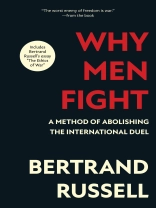Written in the midst of World War I, Why Men Fight lays out Bertrand Russell’s wholesale rejection of the notion that war is inevitable. Russell elucidates the motivations behind human conflict and underscores the inherent futility of settling disputes by waging destructive battles. He identifies war as stemming from a belief in the principle of authority, which supports religion and patriotism-a principle reinforced by private and public educational systems. Russell argues that authority tends to breed autocracy and discord, leading to oppressive conditions that foster conflict and encourage ignorant, despotic, selfish, and self-centered behavior. He posits that humankind can transcend this cycle of violence when instinct and reason are controlled by the life of the spirit, which promotes the impersonal and the universal over individualism and primitive tribal allegiances.
Influential and significant, Why Men Fight solidified Russell’s reputation as a formidable social critic and anti-war activist. This Warbler Classics edition contains Russell’s essay, ‘The Ethics of War, ‘ as well as an extensive, detailed biographical timeline.
表中的内容
Contents
Preface
I The Principle of Growth
II The State
III War As an Institution
IV Property
V Education
VI Marriage and the Population Question
VII Religion and the Churches
VIII What We Can Do
The Ethics of War
Biographical Timeline
关于作者
BERTRAND RUSSELL (1872-1970) was a British philosopher, logician, mathematician, historian, and social critic. In 1950, he was awarded a Nobel Prize in Literature. Russell remained an active social campaigner and prominent public figure until his death at the age of ninety-seven.












